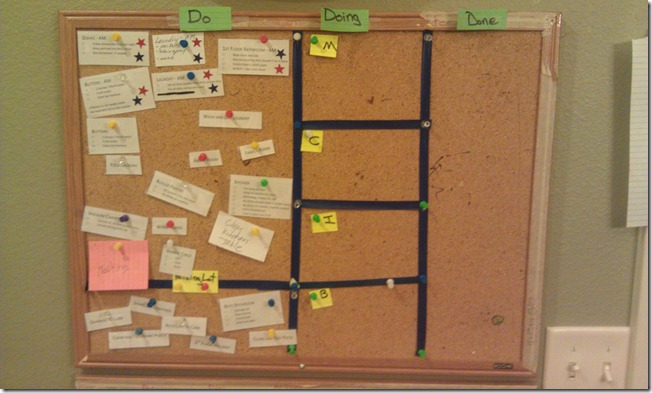As some ElegantCode readers and most visitors to my home know, our family uses methods learned in agile practices to manage day to day operations. Specifically, we have a ?family method? for doing things like homework, chores, and even longer term projects like preparing a research paper.
As is the case with most children, 3 of my 4 kids are basically sociopaths. Although this is improving as they age, the kids are often unable to consider the feelings and positions of others. In short, they lack empathy. One might even propose that gaining empathy is a major part of growing up.
But I digress?
Given this state of affairs, hearing things like, ?That?s not my job,? has been pretty common.
Grrrrrr.
As someone who focuses a lot on self-organizing and cross-functional teams, this makes me want to scream. Of course, we can?t fire the children, so I instead encourage them to tweak the family method and help me find ways we can work as a team instead of as a loose collection of self-interested individuals.
You can imagine my delight when after 7 years of pursuing collective accountability for the kids I recently heard the following conversation between M, my 15-year-old, and C, my 13-year-old.
C: What are you doing?
M: Doing the dishes and cleaning the kitchen.
C: Can I help you?
M: Sure, can you wipe the counters?
I felt like this.
Each week, our family has a Family Meeting in which we inspect and adapt how we work together and the family method itself. We also use a board to visualize and manage work for chores and things.
The board undergoes frequent change as does the process we use. Our current board reflects these principles:
- The work needed each day doesn?t change that much.
- All work is negotiable with mom and dad. Maybe the floors don?t need to be vacuumed today (but they probably do
 ).
). - The available work force to accomplish this work changes a lot, based on the realities of kid scheduling.
- The work needs to be done, regardless of who is available to do the work.
The rules of using the board are posted on the wall under the board itself. They are:
- Only mom or dad may move an item into the parking lot (don?t do this today)
- Each person may have no more than one item in process at a time.
- You are not done with a chore until the work has been reviewed by a sibling or parent.
- No one is done until all work is done.
- The nightly standup meeting may not occur until everyone is done.
- No one may go to bed until the nightly standup meeting is done.
- You must do 2 pushups for every minute late to bed.
This magic combination of rules supporting the above principles coupled with the board below resulted in the notion of group accountability.
Finally.
I may have indeed found it. Time will tell.

I’ve seen this approach before. I can’t remember where, it may been an old post. Regardless, I found this very interesting and quite potential. Any plan is better than having no plan. I like how you simplified your board. My kids are still very young but if they see us, parents, doing this is much easier for them to follow. I hope to feel the way snoopy feels in that picture above
Great idea

But I don’t see parents on the board (not for the homework of course, but for the chores) ! Don’t you parents do the chores ?
Hi my name is yogesh kumar. I like this blog website. I say thanks to that person who made this
http://www.yogesh-kumar.com/
Hi David,
It’s funny because the moment I read the title of your post, I though of an article I have published lately on PM Hut: Stop Agilizing Everything. I hope you’ll have the chance and read it…
Just because you don’t see value doesn’t mean it isn’t there.
Thanks for sharing! This is something can definitely put in place at home and other groups I am part of:)
I really love this approach. I think it’s awesome. Can’t wait to try it with my family at home.
those poor kids..